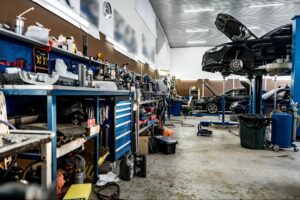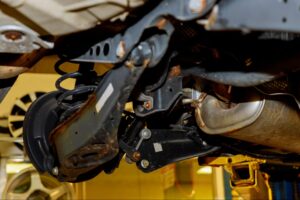
How to Choose the Right Auto Shop for Your Vehicle’s Needs
Car problems never come at a good time and are always more than just a hassle. Whether it’s routine maintenance or urgent suspension repair, the auto shop you choose affects more than the outcome; it affects your time, trust, and budget. Picking the wrong shop could lead to unnecessary costs or recurring issues. You need a place that gets the job done right and treats your vehicle like it matters.
Why Choosing a Reliable Auto Shop Matters
The right auto shop keeps your car running longer and more efficiently. It’s not just about fixing what’s broken but preventing minor issues from turning into expensive repairs. A dependable mechanic protects your vehicle’s lifespan and your peace of mind. It also gives you confidence in every mile you drive.
Routine Maintenance Supports Long-Term Vehicle Value
Keeping up with scheduled maintenance helps preserve your car’s resale value. Services like oil changes, brake checks, and tire rotations show future buyers the vehicle was cared for. Shops that track service history make this easier and more consistent. Additionally, clean records from a trusted mechanic help dealerships and private buyers feel more confident. It can lead to better offers when it’s time to trade in or sell. Inconsistent or poor service history often raises red flags and lowers value.
Preventive Care Reduces Expensive Repairs Later
Catching problems early saves money and avoids roadside emergencies. Shops that inspect thoroughly can find worn parts, fluid issues, or leaks before they escalate. A neglected $50 fix can become a $1,500 repair. Preventive care also means less stress and fewer unexpected trips to the mechanic. A skilled auto shop explains what’s urgent and what’s just wear and tear. This transparency builds trust over time.
Trust Builds Confidence When You’re On the Road
Reliable service means you don’t second-guess your brakes or worry about engine noise. You drive knowing the work was done right and safely. This confidence is essential, especially on long trips or during harsh weather. A trustworthy auto shop makes it easier to follow through with maintenance without hesitation. You get the peace of mind from skilled labor and honest advice. That’s something no discount can replace.
How to Research and Compare Auto Shops Locally
Start by identifying shops that match your location, vehicle type, and service needs. It’s important to compare more than prices—look at reputation, certifications, and transparency. Online reviews and personal referrals can uncover real experiences. Consistency in positive feedback says more than any marketing pitch.
Reviews and Ratings Reveal Customer Experiences
Customer reviews on Google, Yelp, or industry sites reflect fundamental interactions. While stars are helpful, the comments matter more. Pay attention to mentions of service quality, communication, and turnaround time. Be cautious of reviews that sound overly generic or identical—they may not be genuine. Verified reviews often highlight how shops handle problems, which says a lot about their integrity. Repeated complaints or praise usually reveal the real story.
Ask Friends or Coworkers for Mechanic Referrals
Personal referrals offer direct, unbiased opinions. Friends and coworkers often share details you won’t find online, like how long repairs took or whether the price matched the quote. A shop that’s earned loyalty over the years likely delivers consistent quality. If multiple people recommend the same place, it’s worth checking out. These insights are invaluable for specific services, like engine work or alignment. Trust builds faster when recommendations come from people you know.
Check Licenses, Certifications, and Insurance
Legitimate auto shops should hold relevant licenses and carry proper insurance. Certifications from groups like ASE (Automotive Service Excellence) show that technicians meet national standards. Shops may also display manufacturer-specific training, which is a plus if you drive a specialty brand. Insurance protects your vehicle while in their care, offering you additional peace of mind. Don’t be afraid to ask to see these credentials—they should be readily available. Reputable shops won’t hesitate to show proof of their qualifications.

What Services the Auto Shop Should Offer
Your auto shop should match your vehicle’s needs, from basic maintenance to advanced diagnostics. Not all shops handle complex repairs or specialize in specific makes and models. Find one that fits your car’s age, warranty, and condition. The more services under one roof, the more consistent your care will be.
General Maintenance Services
Every quality auto shop should offer oil changes, brake work, tire services, and fluid checks. These routine services help prevent long-term damage and improve fuel efficiency. A shop that handles these quickly and accurately builds your trust for future repairs. Ask how they handle inspections: Do they check belts, filters, and lights with each visit? That shows attention to detail and commitment to safety. Skipping the basics often leads to more serious problems later.
Diagnostic Tools
Modern vehicles rely heavily on electronic systems that need proper scanning tools. A shop without updated diagnostic equipment can misread codes or miss issues entirely. Advanced diagnostics help pinpoint exact problems and reduce guesswork. Additionally, trained technicians should know how to interpret that data correctly. If you drive a newer model, ask if the shop can access your vehicle’s system software. Specialized training in diagnostics shows they’re ready for today’s car technology.
Strong Warranty Coverage
Good auto shops offer service warranties for both labor and parts. That shows they stand behind their work and expect it to last. Some warranties last 12 months or 12,000 miles, while others go longer. Always ask what’s included and whether it covers nationwide or local repairs. A lack of warranty can be a red flag or indicate low-quality parts. Clear warranty terms help you plan with confidence.
Why Auto Shop Location Matters
Practical factors like shop location, wait time, and transportation help you manage car care. Even the best shop isn’t helpful if getting there disrupts your life. Look for one that fits your routine and offers flexible support. That makes regular maintenance easier and less stressful.
Choose a Shop Close to Home or Work
Proximity matters when you must drop off your car or check in on repairs. A shop near your home or job reduces the hassle and keeps you productive. Getting to and from the shop shouldn’t be a struggle if your car needs to stay overnight. Convenience encourages consistent maintenance, which leads to fewer breakdowns. For families or commuters, location can be the deciding factor. Time saved is often money saved.
Look for Extra Services That Save Time
Some shops offer shuttle services, loaner cars, or comfortable waiting areas. These small perks make a big difference during busy weeks. Shops that care about your time usually care about the quality of their work, too. Amenities can show a shop’s commitment to customer satisfaction. Always ask what’s available for longer repairs or full-day service. Even simple conveniences can make you feel valued.
Check Scheduling Options and Wait Times
Long waits and limited hours are red flags. A good auto shop works with your schedule and keeps you informed. If they offer same-day service or weekend hours, that’s a bonus. Consistent communication about repair timelines shows they respect your time. Ask how far out they’re usually booked to help gauge reliability. Shops that run efficiently tend to repair efficiently, too.

How to Gauge the Auto Shop’s Reputation
A shop’s long-term success is built on community trust and consistent service. Look for signs that they treat customers fairly and care about their work. Reputation develops through reliability, not just price. Positive patterns tell you more than a flashy ad ever could.
Experience and Longevity
Shops that have served the same area for years usually know what they’re doing. They’ve built relationships and earned loyalty through honest work. A newer shop isn’t always risky, but a long-running one offers more proof. Experience also means they’ve seen many problems and know how to handle them. Ask how long they’ve been in business and who owns the shop. Stability in leadership matters as much as years of service.
Upfront Estimates and Honest Pricing
A reliable shop gives written estimates that clearly break down costs. You should know precisely what you’re paying for, such as parts, labor, diagnostics, and fees. If prices change mid-repair, they’ll call to explain why. That level of transparency prevents surprises and builds long-term trust. Ask if they match estimates with invoices and what happens if the job takes longer. Clear answers now avoid stress later.
How Customers Are Treated
Respectful communication is non-negotiable. You should feel welcome, not rushed or dismissed. Pay attention to how the mechanics speak to others, especially when busy. Shops that stay calm and helpful under pressure are usually well-run behind the scenes. Good service isn’t just about the repair but the whole experience. You’ll return if the staff treats you like a person, not just a transaction.
Fair Auto Shop Pricing Beats Cheap Shortcuts
Smart car owners balance cost with quality. Don’t chase the lowest price; it often means cutting corners. A fair quote includes all details and uses decent parts. You want value, not regrets.
Request Estimates From More Than One Shop
Getting multiple quotes gives you a realistic price range and shows you who’s overcharging or underbidding. Ask each shop to explain the details behind their numbers. It helps you compare not just cost but quality. Shops that rush through the estimate may rush the job. Clarity is always worth the extra five minutes.
Understand What Each Quote Includes
Quotes should cover everything: parts, labor, and shop fees. Don’t assume two shops offer the same service if the prices match. Ask for a breakdown to see if they use OEM or aftermarket parts. Labor hours can also vary depending on the team’s experience. It’s okay to ask what you’re getting for the price. Knowing the inclusions makes comparisons accurate and valuable.
Avoid Prices That Sound Too Good
Cheap shops often cut corners to stay in business. That could mean reusing old parts or skipping inspection steps. You may save money now, but pay double later. Ask yourself why their price is so much lower, then ask them, too. A shop that won’t explain its pricing may be hiding something. Pay for quality the first time and avoid paying twice.
Visit Before You Commit to Any Auto Shop
A quick visit tells you more than any website or ad ever could. Look around, ask questions, and watch how they operate. If something feels off, it probably is. Firsthand impressions are your best final filter.
Clean, Organized Shops Reflect Serious Work
A well-kept space shows that the shop takes pride in its work. Dirty, disorganized shops often reflect sloppy habits behind the scenes. You want your vehicle in a place where attention to detail matters. Look at tool storage, work bays, and how customers are welcomed. These signs tell you how the shop handles everything else. Clean doesn’t mean sterile; it means controlled and focused.
Ask Mechanics About Services and Process
Technicians should be open to questions and confident in their answers. They should explain the process clearly and make technical terms understandable. Avoid shops where the staff avoid eye contact or give vague responses. If they’re proud of their work, it’ll show in how they talk about it. You don’t need to know everything about cars; you need clear communication. That kind of trust is built in conversation.
Start a Smarter Routine With the Right Auto Shop
Excellent car care doesn’t start with a repair; it begins with the right partner. Building that connection now saves you time, stress, and second-guessing. You don’t need to wait for a breakdown to choose better. Start smarter, and drive with confidence every time you turn the key.
Behind every smooth ride is smart maintenance—discover what the pros know on the Cordova Auto Service & Mufflers blog.




